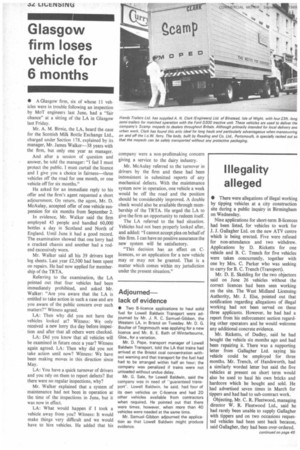Glasgow firm loses vehicle for 6 months
Page 34

If you've noticed an error in this article please click here to report it so we can fix it.
• A Glasgow firm, six of whose 11 vehicles were in trouble following an inspection by MoT engineers last June, had a "fair chance" at a sitting of the LA in Glasgow last Friday.
Mr. A. M. Birnie, the LA, heard the case for the Scottish Milk Bottle Exchange Ltd., charged under Section 178, explained by its manager, Mr. James Walker-38 years with the firm, but only one year as manager.
And after a session of question and answer, he told the manager: "I feel I must protect the public. I must curtail the licence and I give you a choice in fairness—three vehicles off the road for one month, or one vehicle off for six months."
He asked for an immediate reply to his offer and the firm's agent requested a short adjournment. On return, the agent, Mr. D. McAulay, accepted offer of one vehicle suspension for six months from September 2.
In evidence, Mr. Walker said the firm employed 45 people and handled 60,000 bottles a day in Scotland and North of England. Until June it had a good record. The examination showed that one lorry had a cracked chassis and another had a rodend excessively worn.
Mr. Walker said all his 39 drivers kept log sheets. Last year £2,500 had been spent on repairs. He had now applied for membership of the TRTA.
Referring to the examination, the LA pointed out that four vehicles had been immediately prohibited, and asked Mr. Walker: "Are you aware that the LA is entitled to take action in such a case and are you aware of the public concern over such matters?" Witness agreed.
LA: Then why did you not have the vehicles looked at? Witness: We only received a new lorry the day before inspection and after that all others were checked.
LA: Did you know that all vehicles will be examined in future once a year? Witness again agreed. LA: Then why did you not take action until now? Witness: We have been making moves in this direction since May.
LA: You have a quick turnover of drivers and you rely on them to report defects? But there were no regular inspections, why?
Mr. Walker explained that a system of maintenance had not been in operation at the time of the inspections in June, but it was now in effect.
LA: What would happen if I took a vehicle away from you? Witness: It would make things very difficult and we would have to hire vehicles. He added that his company were a non-profitmaking concern giving a service to the dairy industry.
Mr. McAulay referred to the turnover in drivers by the firm and these had been inConsistent in submitted reports of any mechanical defects. With the maintenance system now in operation, one vehicle a week would be off the road and the position should be considerably improved. A double check would also be available through membership of the TRTA. He urged the LA to give the firm an opportunity to redeem itself.
The LA referred to the bad situation. Vehicles had not been properly looked after, and added: "I cannot accept plea on behalf of this firm. I can have no positive assurance the new system will be satisfactory.
"This decision has an effect on Clicences, so an application for a new vehicle may or may not be granted. That is a matter which comes within my jurisdiction under the present situation."










































































































































